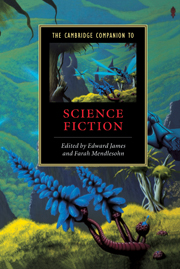Book contents
- Frontmatter
- Introduction
- Part 1 The history
- Part 2 Critical approaches
- Part 3 Sub-genres and themes
- 11 The icons of science fiction
- 12 Science fiction and the life sciences
- 13 Hard science fiction
- 14 Space opera
- 15 Alternate history
- 16 Utopias and anti-utopias
- 17 Politics and science fiction
- 18 Gender in science fiction
- 19 Race and ethnicity in science fiction
- 20 Religion and science fiction
- Further Reading
- Index
- Series List
16 - Utopias and anti-utopias
from Part 3 - Sub-genres and themes
Published online by Cambridge University Press: 28 May 2006
- Frontmatter
- Introduction
- Part 1 The history
- Part 2 Critical approaches
- Part 3 Sub-genres and themes
- 11 The icons of science fiction
- 12 Science fiction and the life sciences
- 13 Hard science fiction
- 14 Space opera
- 15 Alternate history
- 16 Utopias and anti-utopias
- 17 Politics and science fiction
- 18 Gender in science fiction
- 19 Race and ethnicity in science fiction
- 20 Religion and science fiction
- Further Reading
- Index
- Series List
Summary
It is sometimes said that the ability of the writer to imagine a better place in which to live died in the course of the twentieth century, extinguished by the horrors of total war, of genocide and of totalitarianism. The genre of utopia, created unwittingly by Sir Thomas More when he published Utopia in 1516, died when idealism perished, a victim to twentieth-century pessimism and cynicism. It is the contention of this chapter that utopia has not disappeared; it has merely mutated, within the field of sf, into something very different from the classic utopia.
Hoda M. Zaki, whose Phoenix Renewed (1988) is the only published monograph on sf utopias, was on the point of recognizing this, although she failed; as a political scientist, she was still looking in vain for the classic utopia. She concluded that 'the disappearance of utopian literature in the twentieth century is surprising' and 'an issue with serious implications for the entire body politics'. Her study was based on the nineteen novels which had won the Nebula Award between 1965 and 1982. Almost all these novels had utopian elements, she concluded, but none of them were actual utopias: although many of those novels offered critiques of the contemporary world, none of them offered the necessary coherent account of a superior and desirable alternative in the future. Modern sf thus had no utopias to offer, but only ‘tantalizing fragments in the utopian tradition’.
- Type
- Chapter
- Information
- The Cambridge Companion to Science Fiction , pp. 219 - 229Publisher: Cambridge University PressPrint publication year: 2003
- 10
- Cited by

